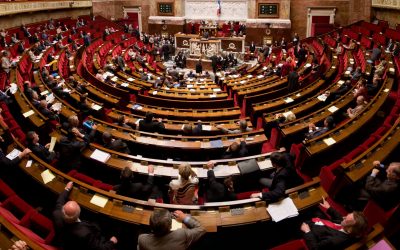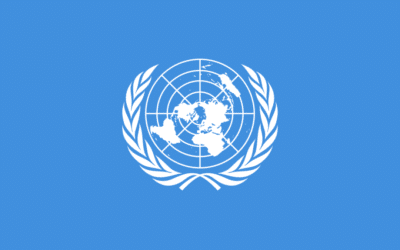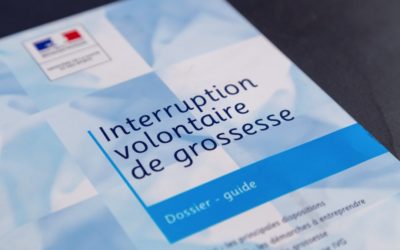The March 20, 2017 law concerning numerical obstruction to abortion was validated by the Constitutional Council, but with some serious reservations which in retrospect confirms some protests that the text was a deliberate infringement of freedom of expression and information.
On February 16, 2017, the National Assembly passed the final version of the law, via an accelerated procedure launched by the government who absolutely wanted to terminate before the end of the legislative term (at the end of February due to the presidential elections). The content of the initial draft law, the first debates, as well as the legal and ethical issues laid out by this text are discussed in our Decoder N° 48 dated December 6, 2016 “Abortion : the MPs vote on numerical obstruction”.
The essence of the new law (with the additions which were finally voted in black italics)
The article L.2223-2 in the Public Health code reads as follows: « Preventing or attempting to prevent an abortion, hindering access to information on abortion, or hindering the practice of any other act prior to abortion as specified in articles L.2212-3 to L.2212-8 is punishable by up to two years’ imprisonment and a € 30,000 fine, including electronic and online means, in particular by broadcasting or transmitting allegations or indications aimed at intentionally misleading people on the characteristics or medical consequences of a voluntary termination of pregnancy”.
« 1° Either by hindering access to the establishments mentioned in article L.2212-2, or hindering the free movement of persons inside the buildings or the work conditions of medical and non-medical personnel.”
« 2° Either by applying psychological or moral pressure, threats or any kind of intimidation towards individuals seeking information on abortion, towards medical and non-medical personnel working in establishments mentioned in the same article L.2212-2 , towards women coming for abortions or those individuals accompanying them.”
In the March 16, 2017 decision rendered by the Constitutional Council, the two reservations cited mainly concern the risk of infringing freedom of expression and communication.
They target a key element pursued in the new text, meaning that the scope of numerical obstruction to abortion is significantly broadened. Previously any pressure, threats or intimidating acts had to be applied in places performing abortions. Now, the offense can be enforced with regard to “anyone looking for information on abortion, regardless of the contact person, the site or the support where the information is made available.”
The 1st reservation noted by the Constitutional Council is as follows: “only broadcasting information to an unspecified audience via any communication tool, especially web sites, will not be considered as constituting pressure, threats, or intimidating acts.”
The 2nd reservation deals with the substance of the new law: “numerical obstruction to abortion (…) will only be considered under two conditions: when soliciting information, and not an opinion; that this information includes describing the conditions whereby abortions are practiced, or its consequences and that it is given by a competent individual or someone pretending to have experience.”
In order to press charges for any offences to this new law, the terminology needs to be well-defined, and have a frame of reference. However, this is not yet the case, especially for the consequences following abortion.
Numerous questions loom. How can one fairly define the difference between a fact and an opinion? When French Health Minister, Mrs. Laurence Rossignol, explains to the National Assembly that abortion does not interrupt a life, is that considered factual information or only her opinion? Will the judge decide on the importance of physical and psychological consequences following abortions? And how will the competence level be evaluated to decide when a person can be condemned? The non-enforcement of this law or trials which will inevitably contest freedom of expression and communication, should therefore be expected.
As a reminder, on February 17, 2017, Alliance VITA filed suit at the administrative court in Paris against the French Health Minister for the inexact and/or biased information published on the government’s official abortion website.


![[Press release] – Alliance VITA’s UDV Bioethics Conference returns in January 2023](https://www.alliancevita.org/wp-content/uploads/2022/12/Article-CP-Alliance-VITA-400x250.jpg)
![[CP] – Citizens’ Convention on the End of Life: Alliance VITA will Take Part Guilelessly](https://www.alliancevita.org/wp-content/uploads/2022/12/CP-Convention-citoyenne-fin-de-vie-400x250.jpg)
![[CP] – Abortion in the Constitution: A Confiscated Debate Far from Reality](https://www.alliancevita.org/wp-content/uploads/2022/07/avortement-constitution-décryptage-400x250.jpg)
![[Press Release]: Abortion Prevention Policy Urgently Needed](https://www.alliancevita.org/wp-content/uploads/2021/01/PPL-IVG-400x250.jpg)
![[Press Release] – The Ethics Committee’s Blatant Contradiction on Palliative Care, Assisted Suicide and Euthanasia](https://www.alliancevita.org/wp-content/uploads/2022/04/FA-header-CCNE-400x250.jpg)
![[Press Release] – Calling for Insurance Companies, to Consider Their Duty of Discretion Rather than Pushing Euthanasia](https://www.alliancevita.org/wp-content/uploads/2015/03/fin-de-vie-280x250.png)

![[Press Release] Alliance VITA’s Response to the 2021-2024 Palliative Care Plan](https://www.alliancevita.org/wp-content/uploads/2017/12/soinspalliatifs-1-400x250.jpg)





![[Press Release] URGENT: Judge Orders Mediatransports to Resume Alliance VITA’s Advertising Campaign](https://www.alliancevita.org/wp-content/uploads/2020/01/Mediatransport-handicap-et-paternité-400x250.jpg)






![[Press Release] European Elections: VITA Focuses on Fragile Generations](https://www.alliancevita.org/wp-content/uploads/2019/05/generations-fragiles-1-400x250.jpg)


![[Press Release] Following Wide-Scale Public Debates: French Opinions on Revising Bioethics Law](https://www.alliancevita.org/wp-content/uploads/2019/06/pma-2-400x250.jpg)
![[Press Release]: Alliance VITA Beckons European Electoral Candidates to Focus on Vulnerable Generations](https://www.alliancevita.org/wp-content/uploads/2018/04/caroline_roux-1-400x250.png)
![[Press Release] New Death Sentence for Vincent Lambert by French Court Order](https://www.alliancevita.org/wp-content/uploads/2019/04/conseildetat-1080x675-1-400x250.jpg)









![[Press Release]: Alliance VITA Denounces Attempt to Abolish Conscience Clause in French Health Bill Reform](https://www.alliancevita.org/wp-content/uploads/2019/03/objectiondeconscience-1080x675-1-400x250.jpg)
![[Press Release] Parliament’s Report on Bioethics: Tumultuous Propositions which Undermine Human Rights](https://www.alliancevita.org/wp-content/uploads/2019/01/bioethique-2-400x250.jpg)
![[Press Release] Alliance VITA Announces 2019’s Bioethics Conference on « The Value of Life »](https://www.alliancevita.org/wp-content/uploads/2018/12/udv2019-1080x675-1-400x250.jpg)

![[PR] Keep Your Hands Off My Daddy: counter demonstrations in 17 cities](https://www.alliancevita.org/wp-content/uploads/2018/11/touchepasamonpere-tugdualderville-1080x675-1-400x250.jpg)
![[Press Release] "Keep Your Hands Off My Daddy!" Campaign Launched](https://www.alliancevita.org/wp-content/uploads/2018/11/touchepasamonpere_ladefense-1080x675-400x250.jpg)
![[Press Release] Alliance VITA Will Launch National Campaign in November to Protect Children’s Best Interest](https://www.alliancevita.org/wp-content/uploads/2018/10/enfance-400x250.jpg)
![[Press Release] Court of Cassation / Surrogacy: Alliance VITA Speaks Out](https://www.alliancevita.org/wp-content/uploads/2018/10/courdecassation-1080x675-1-400x250.jpg)
![[Press Release] French Bioethics Law: CCNE Ignores Ethics](https://www.alliancevita.org/wp-content/uploads/2018/09/ccne-1080x650-400x250.jpg)

![[Press Release] French Bioethics: State Council Favors Individual Interests vs. Children’s Rights!](https://www.alliancevita.org/wp-content/uploads/2018/07/enfant-triste-1080x675-1-400x250.jpg)
![[Press Release] ART and Children’s Rights: A warning from Alliance VITA](https://www.alliancevita.org/wp-content/uploads/2018/06/action-12-juin-5-1080x675-400x250.jpg)
![[Press Release] French Bioethics: Warning against commodification of the human body](https://www.alliancevita.org/wp-content/uploads/2018/06/egb-1080x675-1-400x250.jpg)

![[Press Release] Clandestine Showroom for Reproductive Techniques (ART) Opens in Paris](https://www.alliancevita.org/wp-content/uploads/2018/04/showroom_vita-1080x675-1-400x250.jpg)
![[Press Release] Euthanasia Disguised as Healthcare in France!](https://www.alliancevita.org/wp-content/uploads/2018/04/cese_findevie-1080x675-1-400x250.jpg)
![[Press Release] Euthanasia: Alliance VITA Protests Attempts to Force Laws Through](https://www.alliancevita.org/wp-content/uploads/2018/01/euthanasie-1-1080x675-1-400x250.jpg)
![[Press Release] National Consultations on Bioethics in France: Alliance VITA’s Agenda](https://www.alliancevita.org/wp-content/uploads/2018/01/bioethique-1080x675-1-400x250.jpg)

![[Press Release] « Anticipate before Dying »: Alliance VITA’s awareness campaign](https://www.alliancevita.org/wp-content/uploads/2017/10/anticipons-2-1080x675-1-400x250.png)
![[Press Release] MAP without a father: Alliance VITA involved in defense of children](https://www.alliancevita.org/wp-content/uploads/2017/09/PMAsansPere-1080x675-400x250.jpg)
![[Press Release]: Alliance VITA protests fatherless ART](https://www.alliancevita.org/wp-content/uploads/2017/06/Matignon-e1498662862342-2-400x250.jpg)
![Ethics Committee + ART: Convoluted and Non-consensual Announcement [Press Release]](https://www.alliancevita.org/wp-content/uploads/2017/06/PMAsansPere1-2-400x250.jpg)


